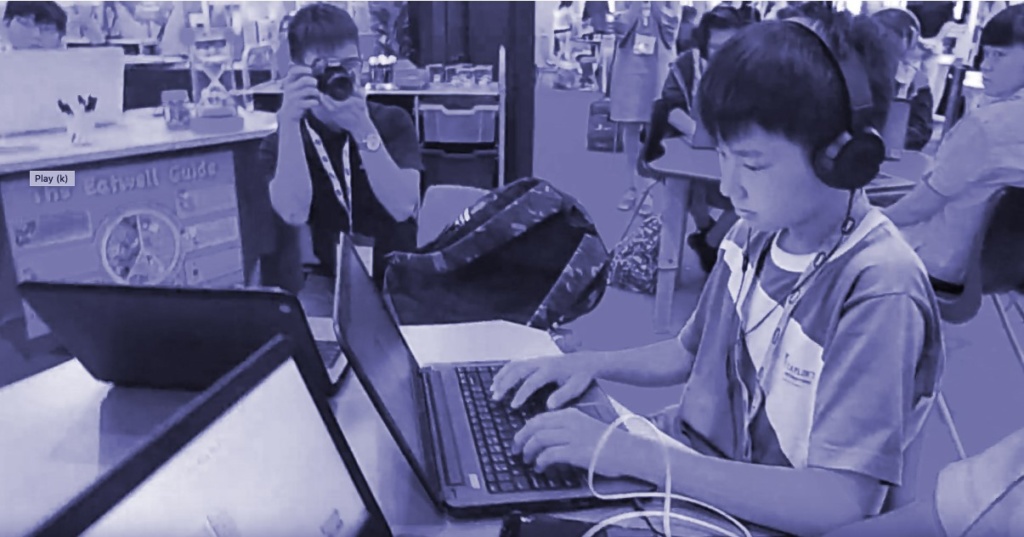
I lived and worked in France for many years before moving back to the UK and taking over the touch typing product KAZ Type Limited with my wife Sheraleen.
We updated the technology, worked with Open University to make sure KAZ could be rolled out successfully to large cohorts of home learners. We also create new editions: a Junior edition, a Corporate edition for companies and improved the SEN edition so it could meet a wider range of needs for neurodiverse students.
We know touch typing is often included in the curriculum for international schools so we were delighted to meet Iain Stevens, Head of Curriculum Support at Taylor’s International School, Kuala Lumpur at a ‘live classroom’ at BETT Malaysia in 2017. Interview with Iain Stevens https://www.youtube.com/watch?v=-IXxBJ-D2dY&t=2s
In a packed timetable it is hard to find the time for extra subjects but according to the Daily Mail, some of the most prestigious independent schools such as Eton and Brighton College have added it to the curriculum at the request of parents.
These days many people in the professions such as doctors and solicitors are expected to input their own text, while those heading to university will be expected to word process their own assignments so touch typing is an excellent skill to learn as early as possible.
Learning the skill
Our stats still show that as many as 7 in 10 people still hunt and peck at the keyboard. One of the reasons why children are not keen on touch typing is that they manage quite well with hunt and peck. When they start touch typing, they need to go back to basics but as we know, most children are keen to get on with the next new thing rather than improving their skills.
That brings me to reculez pour mieux sauter – which roughly translates as pull back to jump further forward. Amanda McLeod, an expert on neurodiversity who is a specialist in touch-typing and handwriting, says: ‘Some have taught themselves keyboard skills and learnt some bad habits,’ she said. ‘This is why it’s important to talk to them about going back and starting again assuring them that if they persevere with touch typing they will get faster and more accurate.’
Research by Pitman Training shows that people who type with two fingers manage between 27 and 37 words a minute while touch typists can reach between 50 and 70 words a minute.
But it is not just about speed. Over a lifetime hunt and peck will damage the body because the writer is hunched over the keyboard rather than sitting back and looking at the screen.
Occupational therapists reckon that touch-typing is one of the best ways to combat repetitive strain injury in later life and this is one of the reasons why companies are increasingly recommending touch typing as part of apprenticeships.
In fact, learning to touch type can be quite a speedy process. With KAZ, the majority of students will learn the basics in just 90 minutes and can quickly achieve speeds of 35 word per minutes.
This is because we use a patented Accelerated Learning method which uses just five phrases to train the fingers and engage both hemispheres of the brain.
Five good reasons to learn touch typing
- Children can soon type faster than they can write
- It uses a kinaesthetic approach so children remember patterns on the keyboard and, as with handwriting, develop a sense of what feels right
- It is less tiring than the ‘hunt and peck’ technique used for texting
- It offers a chance to revisit phonics and basic spellings in a new context so it can be good revision, especially for learners with dyslexia
- Learners do not have to switch their focus from screen to keyboard so it makes fewer demands on a child’s visual tracking ability
Kaz has now been accredited by City and Guilds. The assessment consists of a multiple choice paper consisting of 15 questions covering posture, Repetitive Strain Injury and typing technique plus a three minute typing test lasting where the candidate needs to type at 35 words/minute, with an accuracy of 80%.
Learners get one of the new digital badges accreditations that they can put on social media or on their CV so it is an increasingly popular option for after-school clubs.
It could also be an excellent use of time during lockdown. Students will learn a skill that will serve them well for online learning, for exams and for their future career.
https://kaz-type.com/newfolder/City&GuildsBrochure1.pdf
Register for free
No Credit Card required
- Register for free
- Free TeachingTimes Report every month